People who've hit roadblocks in their lives often like to quote famed inventor Thomas Edison who once declared: "I have not failed. I've just found 10,000 ways that won't work."
So using that Edisonian logic I guess we could say the Conservative Party didn't fail in the last federal election, it just found 10,000 ways that won't work when it comes to wooing voters.
OK maybe that's an exaggeration, but in his recently released internal report on the Conservative Party's loss, former Tory cabinet minister John Baird actually did identify several faults with its campaign: poor candidates screening, too much centralized control given to the campaign manager, bad communications strategy, inexperienced staffers, etc.
Now, of course, this report can be used to play the "blame game", but it can also serve to remind us as to just how much work goes on behind the scenes when it comes to putting together a winning electoral campaign, that a successful campaign needs more than just a high-quality candidate; it also needs a good team to back up that candidate.
In fact, even Ronald Reagan, the "great communicator" whose personal communication skills were legendary, would not have been Reagan, were it not for all the expert strategists working under him.
To see what I mean, let's consider how over the years, Reagan's team helped to create his winning brand.
To start with, keep in mind, back in the mid-1970s, when Reagan was seeking the Republican presidential nomination against then incumbent Gerald Ford, his political persona had not yet been defined.
But then his chief pollster, the late Arthur Finkelstein (who also happened to be my mentor), discovered something through his polling, that helped change all that.
What Finkelstein had uncovered was that conservatives at the time were livid at how the American government was negotiating to hand over control of the Panama Canal to Panama.
Hence Finkelstein urged Reagan to make the canal treaty one of his top issues, which he did and although he still ended up narrowly losing to Ford in 1976, his strong stance on this issue firmly established him in the minds of American conservatives as their champion, which helped to eventually propel him to the presidency.
In short, Finkelstein's polling advice helped Reagan become Reagan.
Mind you, once a pollster has pinpointed potential winning issues, it's then up to the communications people on the campaign team to take that information and boil it down to a persuasive message that will fit on bumper sticker or on a billboard or that it can be communicated in a 30 television spot.
And Reagan had people who could do that.
For example, in the 1984 presidential election, Reagan's pollsters discovered Americans were warming up to Democratic nominee Walter Mondale's plan to negotiate with the Soviet Union and becoming wary with the Republican president's "tough guy" stance.
Therefore, to show that Reagan was still the best man to deal with the Russians, his team came up what's known today as the "Bear in the Woods" TV ad.
This ad featured a grizzly bear walking through a forest, while a narrator declared: "There is a bear in the woods. For some people, the bear is easy to see. Others don't see it at all. Some people say the bear is tame. Others say it's vicious and dangerous. Since no one can really be sure who's right, isn't it smart to be as strong as the bear?" It ended with a tag line showing up on the screen: "President Reagan: Prepared for Peace."
In other words, Reagan's writers devised a clever metaphor (the bear being the Soviet Union) to get their message across.
And finally, a good campaign team needs strategists who can anticipate and prepare for any problems that might confront their candidate.
In Reagan's case, by the 1984 presidential election, that meant anticipating objections to his age; he was 73 at the time.
So during a televised debate, when he was asked if he was too old to be president, Reagan quipped, "I will not make age an issue of this campaign. I am not going to exploit, for political purposes, my opponent's youth and inexperience."
The line not only got a laugh, but it also totally defused the age issue.
Now it's entirely possible, Reagan ad libbed that line, but I strongly suspect someone on his staff, knowing the age question would come up, prepared it for him.
So the point I'm trying to make here, is that if the Conservative Party wants to succeed it will not only need to select a talented leader, it'll also need to surround that leader with a talented cast pollsters, media people, ad writers, fundraisers.
Working together, a good leader and a good team can come up with 10,000 ways to win.
Photo Credit: National Review






